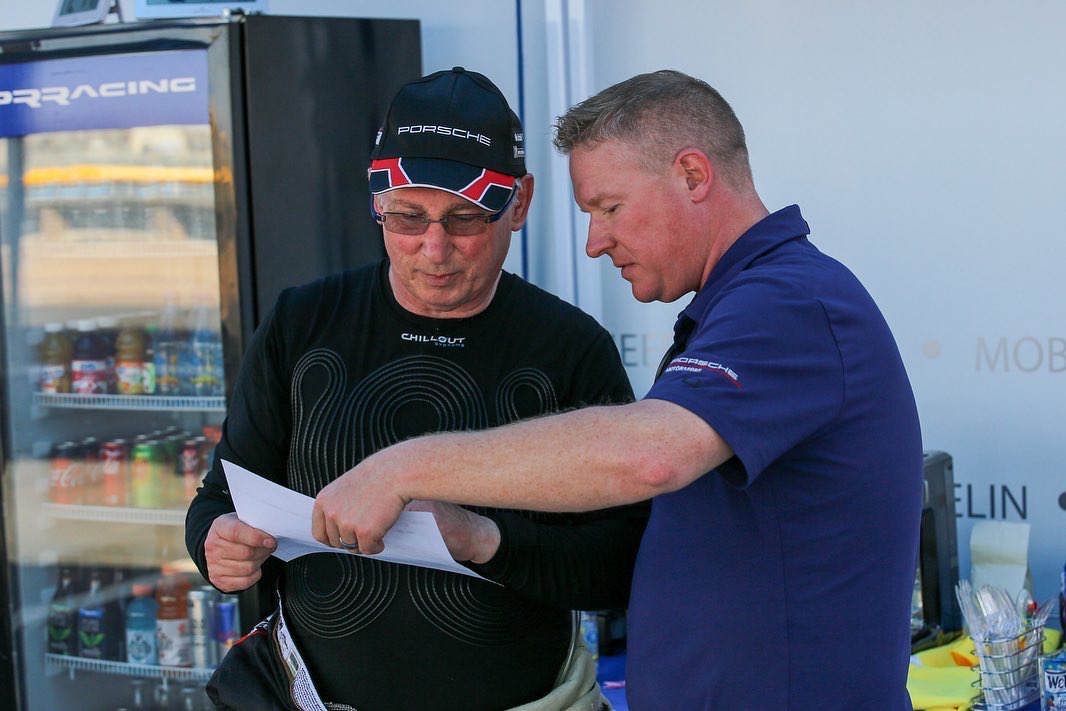Photo: Robb Todd (my coach from BR Racing) reviewing telemetry-based trace data from my fast lap.
Introduction to Telemetry-Based Coaching
Driving a race car is a thrilling and exciting experience. It requires a combination of skills, including quick decision-making, precision, and focus. To become a successful race car driver, one needs to have a natural talent for driving and excellent training. With the advancement of technology, training has become more accessible and effective than ever before. One such advancement is telemetry-based coaching sessions.
Telemetry-based coaching sessions use telemetry data to analyze a driver’s performance on the track. This data is collected by a telemetry system installed in the race car, which records various parameters, such as speed, throttle, braking, and steering inputs. The data is then analyzed by a coach, who provides feedback to the driver on how to improve their performance.
Understanding Telemetry and Telemetry Analysis
Telemetry is the collection of data from remote or inaccessible locations and its transmission to a receiving station for monitoring and analysis. Telemetry systems have been used in various industries, including space exploration, medicine, and aviation. In the motorsports industry, telemetry is used to collect data from race cars to analyze their performance.
Telemetry analysis is the process of interpreting the data collected by a telemetry system. In the context of motorsports, telemetry analysis is used to analyze a driver’s performance on the track. The data collected by the telemetry system is analyzed by a coach or an engineer, who then provides feedback to the driver on how to improve their performance.
Benefits of using a Telemetry-Based Coaching System
Telemetry-based coaching has several benefits over traditional coaching methods. One of the biggest benefits is the ability to collect and analyze data in real-time. This allows coaches to provide immediate feedback to the driver on their performance, which can help them make adjustments on the fly.
Another benefit of telemetry-based coaching is the ability to collect and analyze large amounts of data. This data can be used to identify patterns and trends in a driver’s performance, which can help coaches develop personalized training programs for each driver.
How Telemetry-Based Coaching Works
Telemetry-based coaching works by collecting data from a telemetry system installed in the race car. I have used Cosworth, MoTeC and VBOX systems in my race cars over the past several years. Currently, I’m allowed to use Cosworth and VBOX in the series I’m running.
Data collected from the telemetry system is either transmitted to a receiving station, where it is analyzed by a coach or an engineer in real-time, or is collected from a data logger at the end of a session. The coach then provides feedback to the driver on their performance.
The feedback provided by the coach can be in many forms including: verbal instructions, visual aids, or written reports. The feedback is tailored to the driver’s individual needs and can help them improve their performance on the track.
Features of a Racing Telemetry System
A racing telemetry system is a complex system that consists of several components, including sensors, data loggers, and transmitters. The sensors are responsible for collecting data on various parameters, such as speed, throttle, braking, and steering inputs. The data loggers store the data, and the transmitters transmit the data to a receiving station.
Some of the features of a racing telemetry system include GPS tracking, which allows coaches to track the race car’s position on the track. This can help coaches identify areas where the driver may be losing time or making mistakes.
Another feature of a racing telemetry system is the ability to monitor the engine’s performance, tire pressure and temperature, water and oil temperature, and many other factors. This can help coaches identify any issues with the car and its performance.
The Importance of Racing Coaching
Racing coaching is essential for any aspiring race car driver. I’ve personally used a coach for the past 4 years. A coach can help a driver improve their technique, develop a personalized training program, and provide feedback on their performance. Without coaching, it can be challenging to identify areas for improvement and develop the necessary skills to become a successful race car driver.
Coaching also helps a driver develop mental toughness, which is essential in the high-pressure environment of motorsports. A coach can help a driver develop strategies for staying focused and calm under pressure, which can help them perform at their best when it matters most.
How Telemetry-Based Coaching can help Race Car Drivers
Telemetry-based coaching can help race car drivers improve their performance on the track in several ways. First, telemetry-based coaching provides real-time or near real-time feedback, which allows drivers to make adjustments as required. This can help drivers improve their lap times and reduce their risk of making mistakes.
Second, telemetry-based coaching provide a wealth of data that can be used to identify areas for improvement. The data collected by the telemetry system can be analyzed to identify patterns and trends in a driver’s performance. This can help coaches develop personalized training programs that target specific areas for improvement.
Third, telemetry-based coaching sessions can help drivers develop mental toughness. The high-pressure environment of motorsports can be challenging, but with the help of a coach, drivers can develop strategies for staying focused and calm under pressure.
Understanding the Data from Telemetry-Based Coaching
The data collected by a telemetry system can be overwhelming for some drivers. However, understanding the data is essential for improving performance on the track. Some of the data that can be collected by a telemetry system includes speed, throttle position, brake pressure, and steering inputs.
Understanding the data can help drivers identify areas for improvement. For example, if a driver is consistently losing time in a particular corner, the data can be analyzed to identify the cause of the issue. Once the issue has been identified, the driver can work with their coach to develop strategies for improving their performance in that corner.
Conclusion – Unlocking the Potential of Race Car Drivers with Telemetry-Based Coaching
Telemetry-based coaching are a powerful tool for improving the performance of race car drivers. By collecting and analyzing data in real-time, coaches can provide immediate feedback to drivers on their performance. This feedback can help drivers make adjustments on the fly, which can lead to improved lap times and reduced risk of making mistakes.
Telemetry-based coaching also provides a wealth of data that can be used to identify patterns and trends in a driver’s performance. This data can be used to develop personalized training programs that target specific areas for improvement.
Finally, telemetry-based coaching helps drivers develop mental toughness, which is essential in the high-pressure environment of motorsports. With the help of a coach, drivers can develop strategies for staying focused and calm under pressure, which can help them perform at their best when it matters most.
If you are an aspiring race car driver, consider incorporating telemetry-based coaching into your training program. The benefits are clear, and with the right coach, you can unlock your full potential on the track. I know I have and am still unlocking my potential.

